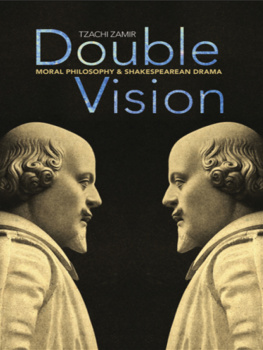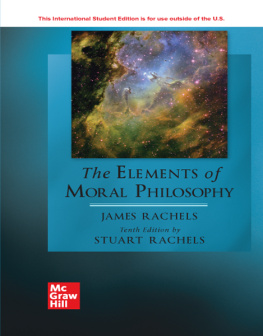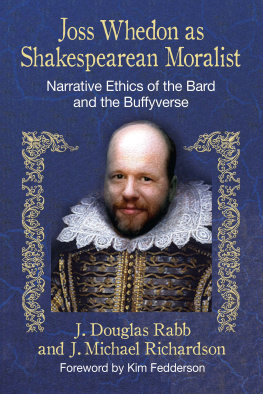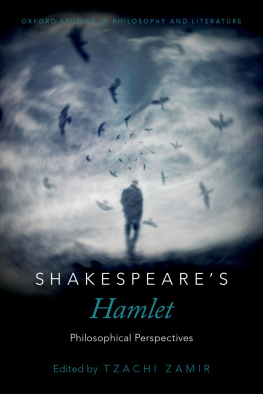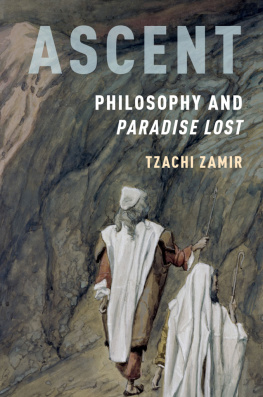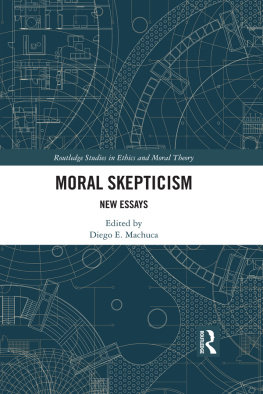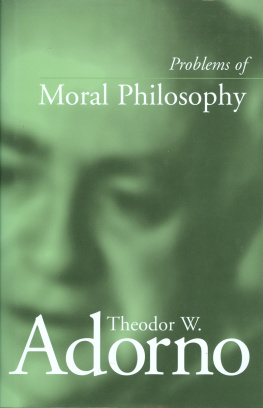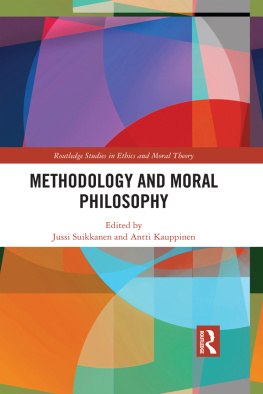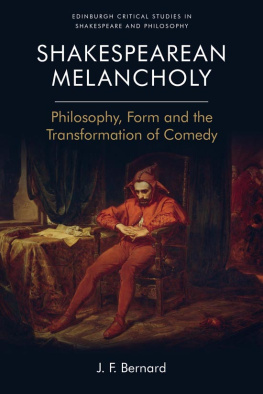Zamir - Double vision moral philosophy and Shakespearean drama
Here you can read online Zamir - Double vision moral philosophy and Shakespearean drama full text of the book (entire story) in english for free. Download pdf and epub, get meaning, cover and reviews about this ebook. City: Princeton;N.J;Woodstock, year: 2012, publisher: Princeton University Press, genre: Romance novel. Description of the work, (preface) as well as reviews are available. Best literature library LitArk.com created for fans of good reading and offers a wide selection of genres:
Romance novel
Science fiction
Adventure
Detective
Science
History
Home and family
Prose
Art
Politics
Computer
Non-fiction
Religion
Business
Children
Humor
Choose a favorite category and find really read worthwhile books. Enjoy immersion in the world of imagination, feel the emotions of the characters or learn something new for yourself, make an fascinating discovery.
- Book:Double vision moral philosophy and Shakespearean drama
- Author:
- Publisher:Princeton University Press
- Genre:
- Year:2012
- City:Princeton;N.J;Woodstock
- Rating:4 / 5
- Favourites:Add to favourites
- Your mark:
- 80
- 1
- 2
- 3
- 4
- 5
Double vision moral philosophy and Shakespearean drama: summary, description and annotation
We offer to read an annotation, description, summary or preface (depends on what the author of the book "Double vision moral philosophy and Shakespearean drama" wrote himself). If you haven't found the necessary information about the book — write in the comments, we will try to find it.
Zamir: author's other books
Who wrote Double vision moral philosophy and Shakespearean drama? Find out the surname, the name of the author of the book and a list of all author's works by series.
Double vision moral philosophy and Shakespearean drama — read online for free the complete book (whole text) full work
Below is the text of the book, divided by pages. System saving the place of the last page read, allows you to conveniently read the book "Double vision moral philosophy and Shakespearean drama" online for free, without having to search again every time where you left off. Put a bookmark, and you can go to the page where you finished reading at any time.
Font size:
Interval:
Bookmark:
DOUBLE VISION
DOUBLE VISION
Moral Philosophy and Shakespearean Drama
Tzachi Zamir
P R I N C E T O NU N I V E R S I T YP R E S S
P R I N C E T O NA N DO X F O R D
Copyright 2007 by Princeton University Press
Requests for permission to reproduce material from this work should be sent to Permissions, Princeton University Press
Published by Princeton University Press, 41 William Street, Princeton, New Jersey 08540
In the United Kingdom: Princeton University Press, 3 Market Place, Woodstock,
Oxfordshire OX20 1SY
All Rights Reserved
British Library Cataloging-in-Publication Data is available
Library of Congress Cataloging-in-Publication Data Zamir, zachi, 1967
Double vision : moral philosophy and Shakespearean drama / Tzachi Zamir.
p. cm.
Includes bibliographical references and index.
eISBN: 978-1-40082-743-5
1. Shakespeare, William, 15641616Criticism and interpretaion. 2. Shakespeare, William, 15641616Philosophy. 3. Philosophy in literature. 4. LiteraturePhilosophy. 5. LiteratureHistory and criticismTheory, etc. 6. CriticismMoral and ethical aspects. 7. Literature and morals. I. Title.
PR3001.Z36 2007
822.3'3dc22 2006012108
This book has been composed in Sabon
Printed on acid-free paper. ?
pup.princeton.edu
Printed in the United States of America
1 3 5 7 9 10 8 6 4 2
HOW FINE IT WOULD BE, AGATHON, HE SAID,IF WISDOM WERE A SORT OF THING THATCOULD FLOW OUT OF THE ONE OF US WHO ISFULLER INTO HIM WHO IS EMPTIER, BY OURMERE CONTACT WITH EACH OTHER, AS WATERWILL FLOW THROUGH WOOL FROM THE FULLERCUP INTO THE EMPTIER. IF SUCH IS INDEED THECASE WITH WISDOM, I SET A GREAT VALUE ON
MY SITTING NEXT TO YOU.
SYMPOSIUM
Contents
Acknowledgments
SOME CHAPTERS in this book were first formulated as part of a Ph.D. dissertation at Tel-Aviv University. I take this opportunity of thanking (again) my supervisor, Marcelo Dascal, for his intellectual influence and committed supervision. I am also indebted to Elizabeth Freund, Zephyra Porat, and Shirley Sharon-Zisser for their willingness to initiate a philosopher into the interests and motivations of literary critics. Eddy Zemach is among the few people who are practicing philosophers as well as literary critics, and his comments and friendship have meant a great deal to me and to the literary and theoretic orientation of that Ph.D.
The book was completed during a post-doc stay at the University of Chicago, enabled by a Rothschild fellowship and a grant by the Fulbright program. The University of Chicago is where some of the best work on philosophy and literature is done, and my firsthand acquaintance there with the people doing this work was the best intellectual gift I could have received. I am grateful to both foundations for making the stay possible.
Faculty members at the University of Chicago have been very generous in communicating their comments on shorter and longer portions of this book. I am obliged for such important input to David Bevington, Wayne Booth, Daniel Brudney, Bradin Cormack, Robert Pippin, and Richard Posner. I have also benefited from eavesdropping on seminars given by David Bevington, Joshua Scodel, Martha Nussbaum, and Richard Strier, as well as a workshop on Shakespeare and law, jointly taught by Martha Nussbaum and Richard Posner. My debts to Nussbaum are great and of several kinds: the initial impact of her writings has inspired me to take up this project in the first place. Yet, more than a formative influence, readers who are familiar with Nussbaums writings will easily note the tight and ongoing dialogue that this book conducts with her thoughts. Finally, her comments on the entire manuscript have substantially transformed it at a crucial stage.
Chapters in this book have been published in previous forms in various journals. An earlier version of chapter one appeared under the title An Epistemological Basis for Linking Philosophy and Literature, and appeared in Metaphilosophy 33 (3), April 2002, pp. 32136. Earlier versions of chapters four and five appeared in New Literary History [A Case of Unfair Proportions: Philosophy in Literature, (3), 1998, pp. 50120, and Upon One Bank and Shoal of Time, (3), 2000, pp. 52951]. Earlier versions of chapters six and seven appeared in Literatureand Aesthetics [Love Stories: A Reading of Romeo and Juliet, 1999, pp. 7198, and Mature Love: A Reading of Antony and Cleopatra, 11, 2001, pp. 11948]. An earlier version of chapter eight originally appeared in Mosaic: A Journal for the Interdisciplinary Study ofLiterature 35 (3) September 2002, pp. 16782). An earlier version of chapter nine appeared in Partial Answers: Journal of Literature and theHistory of Ideas [On Being Too Deeply Loved, 2 (2), June 2004, pp. 126]. I would like to thank these journals for permission to revise and incorporate this material here.
Introduction
HATRED, IT SEEMS, cannot be bought. They try, several times, doubling and tripling the money owed. But he persists in refusing. No amount of money will buy Shylock. In this he stands alone. Within all other relationships around him, emotions are inseparable from financial gain: Portia and Jessica are richnot merely faira fact that never escapes their lovers or their own perceptions of these lovers. Male friendship toothe idealized commitments between Bassanio and Antoniois contaminated by financial dependency. Hatred alone achieves purity in the moral cosmos of The Merchant of Venice, the only emotion that will remain distinct from prudence, the one emotion that they will insist on not understanding (Bassanio: Do all men kill the things they do not love? Shylock: Hates any man the thing he would not kill?). Knowingly going to trial with a losing suitand suppose that the law authorizes him to kill Antonio, what then?turns this trial into a presentation of something that Venice is unwilling to hear (Duke: Upon my power, I may dismiss this court!). Shylock, the dramatized oxymoron of a money-shunning Jew, will soon disappear, to everyones relief, including our own. But not before he registers a complaint that he refuses to express directly (I will not answer that!; I am not bound to please thee with my answers!).
What is Shylocks complaint? Law is conceived in The Merchant ofVenice as more than means for adjudicating between conflicting claims or enforcing norms. Like theologized money (my Christian ducats), law is a vehicle for communication between a Jewish outside and a Christian nexus. Shylocks deployment of law thus parallels similar attempts by marginalized characters to trespass into formally impenetrable power structures (a disguised woman attempting to infiltrate the masculine world of law; another woman trying to use money so as to buy her way out of Judaism). The confrontation between Shylock and Portia within the context of the law thereby presents two symbolic outsiders who turn the law into a means of contact: Shylock directly and Portia through disguising herself as a man, thus gaining momentary power and agency, and breaking out of the passive role of an exquisite trophy in which she is cast at the beginning of the action. The outcome, read politically, is unsurprising: the play allows for a successful penetration into power only indirectly, momentarily, under camouflage, whereas when it is explicit and unveiled (The Jew) it will be annihilated financially and spiritually.
Within this legal context, Shylock will put himself on record. His resistance is subtle, since law itself seems to be presented in the play as a majestic force that will not be manipulated, and one that would ultimately cohere with justice by managing to block a fiendish plea. Law appears to be a legitimating marvel: it includes religious valuesthe numerous appeals to Christian-colored virtues such as valuing mercy over justice, the latter being a mere cardinal virtue to which the morality of the Jew is limited. But when religion cannot suffice, law generates a technical vocabulary of its own that guarantees that justice will be done.
Next pageFont size:
Interval:
Bookmark:
Similar books «Double vision moral philosophy and Shakespearean drama»
Look at similar books to Double vision moral philosophy and Shakespearean drama. We have selected literature similar in name and meaning in the hope of providing readers with more options to find new, interesting, not yet read works.
Discussion, reviews of the book Double vision moral philosophy and Shakespearean drama and just readers' own opinions. Leave your comments, write what you think about the work, its meaning or the main characters. Specify what exactly you liked and what you didn't like, and why you think so.

